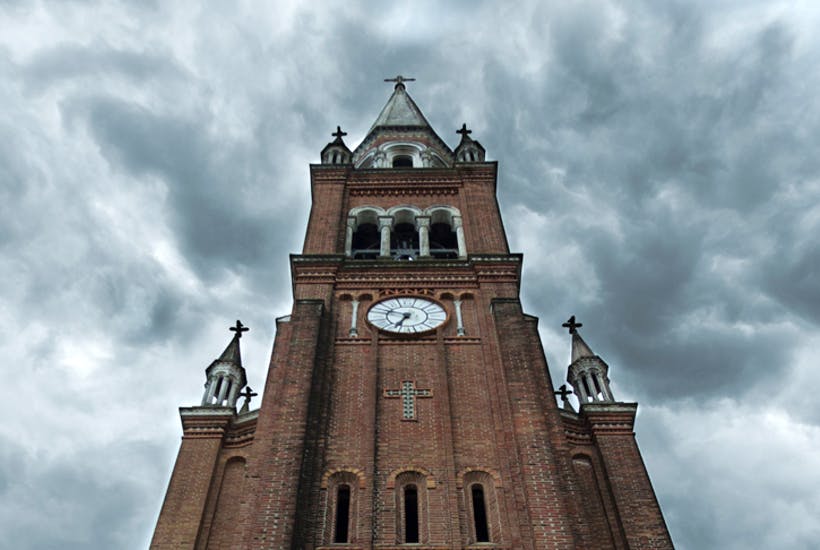Writing the Wrongs of the Catholic Church
By Thomas Keneally
This may seem an odd thing to say about a writer who’s been officially declared a National Living Treasure in his native Australia, and was shortlisted for the Booker Prize three times before winning it with Schindler’s Ark — but I sometimes think Thomas Keneally is badly underrated. After all, Schindler’s Ark won that Booker Prize 35 years — and 19 Keneally novels — ago, and since then his reputation appears to have settled down into that of a solid craftsman: the sort of novelist who rarely lets you down, but who never quite hits the literary heights either. As to how this wildly unjust verdict has come about, my own theories would include the traditional suspicion of prolifigacy (in those 35 years, Keneally has also written 18 non-fiction books); and maybe even that his unfailing good-bloke geniality doesn’t fit our preferred image of a Great Author. One thing that certainly can’t be the reason, though, is the quality of Keneally’s work. Of course, as he genially admits, over a 53-year career, some of his books have been better than others. Now and again, his tendency to wear his considerable heart on his sleeve can lead to sentimentality — as in 1989’s Towards Asmara, about the Eritrean fight for independence. Yet at his best — 2012’s towering first world war novel Daughters of Mars, for example — he’s pretty much matchless: his humanism combined with clear-eyed analysis, exhilarating story-telling and prose of unforced grandeur. On that spectrum, Crimes of the Father falls somewhere in the middle — which is to say that it’s merely very good indeed. The subject is one that, amid all his literary globe-trotting and time-travelling, Keneally has regularly returned to: the Australian Catholic church (itself a result of another of his abiding themes — the sheer weirdness of Irish history being lived out 13,000 miles from Ireland). He himself trained as a priest, leaving just before ordination: partly through an increasing unease about the Church’s sexual attitudes, and partly through a realisation that behind the compelling mystery of Catholicism, with its foundation in the message of ‘Caritas Christi’ [the love of Christ] … lay a cold and largely self-interested corporate institution. Nearly 60 years later neither of these things, it seems, has lost the power to shock him. The book is set in the mid-1990s when the accusations of clerical sexual abuse were becoming impossible to ignore — and when, as a heartfelt Author’s Note says, ‘the Church, faced with this crisis, reached not for the compassion of Christ but for the best lawyers available’. Yet, despite being only ‘a cultural Catholic’ these days, Keneally clearly still feels the sting of betrayal — not least because the ideals being betrayed, he firmly suggests, continue to be of value. In fact, the novel’s hero Fr Frank Docherty is an unmistakable embodiment of them. Docherty’s faith may no longer be ‘co-extensive’ with his ‘world view’, as Keneally acutely puts it, but his commitment to Caritas Christi remains undiminished. Back in 1972, his opposition to the Vietnam war and the Church’s ban on artificial contraception meant the Archbishop of Sydney had him exiled to Canada, where he’s recently been studying the psychology of child abuse. Now, he’s back in Sydney for three weeks to give a not entirely welcome lecture on his findings. From there, the plot does require a few handy coincidences to get going. (In his self-deprecating way, Keneally has acknowledged that Schindler’s Ark is his best-plotted novel — ‘and the humiliating thing is that the plot already existed’.) For a start, Docherty is picked up at the airport by a taxi-driver who herself suffered clerical abuse as a young teenager. It then turns out that the priest responsible is not only the brother of a woman that Docherty once loved, but is also leading the Church’s attempts to keep the whole scandal under wraps. Fortunately, all this is put in place without much fuss — and once it has been, the novel can get down to its real business of providing an exploration of Australian Catholicism that manages to be impressively thorough without seeming over-systematic — and that combines indignation and sorrow with a genuine attempt to understand (although not to excuse) the Church’s actions. As ever, too, Keneally is extraordinarily generous in his story-telling, with all the main characters having richly-imagined pasts that are sometimes useful for illustrating the points he wants to make — but sometimes appear to be there just for the purposes of giving the reader even more to relish. In the end, there’s still no denying that this is fundamentally an issue-driven book. Nonetheless, the force and resonance of the issue in question — together with Keneally’s wise and thoughtful treatment of it — make for another hugely satisfying read from one of the world’s great writers.
|
.
Any original material on these pages is copyright © BishopAccountability.org 2004. Reproduce freely with attribution.
